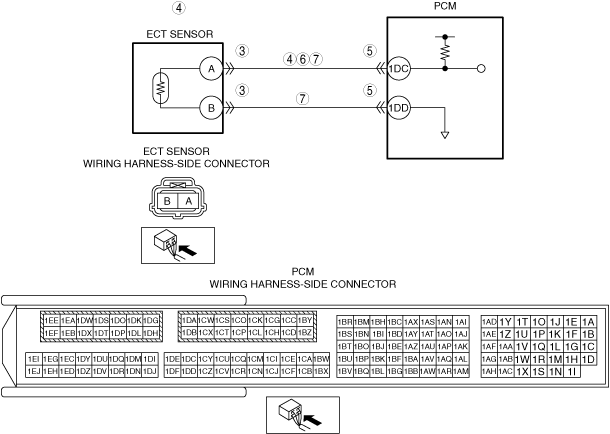|
1
|
RECORD VEHICLE STATUS WHEN DTC WAS DETECTED TO UTILIZE WITH REPEATABILITY VERIFICATION
-
Note
-
• Recording can be facilitated using the screen capture function of the PC.
• Record the freeze frame data/snap shot data.
|
—
|
Go to the next step.
|
|
2
|
VERIFY IF MALFUNCTION IS CAUSED BY OVERHEATING
• Verify the vehicle engine condition.
• Is the engine overheating?
|
Yes
|
Perform malfunction diagnosis according to [NO.22 COOLING SYSTEM MALFUNCTION (OVERHEAT)].
|
|
No
|
Go to the next step.
|
|
3
|
INSPECT ECT SENSOR CONNECTOR CONDITION
• Switch the ignition OFF.
• Disconnect the ECT sensor connector.
• Inspect the connector engagement and connection condition, and inspect the terminals for damage, deformation, corrosion, or disconnection.
• Is the connector normal?
|
Yes
|
Go to the next step.
|
|
No
|
Repair or replace the connector, then go to Step 8.
|
|
4
|
DETERMINE IF MALFUNCTION IS CAUSED BY ECT SENSOR MALFUNCTION OR WIRING HARNESS SIDE MALFUNCTION
• Verify that the ECT sensor connector is disconnected.
• Switch the ignition ON (engine off).
-
Note
-
• Another DTC may be stored by the PCM detecting an open circuit.
• Measure the voltage at ECT sensor terminal A (vehicle wiring harness side).
• Is the voltage approx. 5 V?
|
Yes
|
Replace the ECT sensor, then go to Step 8.
|
|
No
|
Go to the next step.
|
|
5
|
INSPECT PCM CONNECTOR CONDITION
• Disconnect the PCM connector.
• Inspect the connector engagement and connection condition, and inspect the terminals for damage, deformation, corrosion, or disconnection.
• Is the connector normal?
|
Yes
|
Go to the next step.
|
|
No
|
Repair or replace the connector, then go to Step 8.
|
|
6
|
INSPECT ECT SENSOR SIGNAL CIRCUIT FOR SHORT TO GROUND
• Verify that the ECT sensor connector and the PCM connector are disconnected.
• Switch the ignition OFF.
• Inspect for continuity between ECT sensor terminal A (vehicle wiring harness side) and body ground.
• Is there continuity?
|
Yes
|
Refer to the wiring diagram and verify if there is a common connector between ECT sensor terminal A and PCM terminal 1DC.
If there is a common connector:
• Inspect the common connector and terminals for corrosion, damage, or disconnection and the common wiring harnesses for short to ground to determine the malfunctioning location.
• Repair or replace the malfunctioning location.
If there is no common connector:
• Repair or replace the wiring harness which is shorted to ground.
Go to Step 8.
|
|
No
|
Go to the next step.
|
|
7
|
INSPECT ECT SENSOR SIGNAL CIRCUIT AND GROUND CIRCUIT FOR SHORT CIRCUIT
• Verify that the ECT sensor connector and the PCM connector are disconnected.
• Inspect for continuity between ECT sensor terminals A and B (vehicle wiring harness side).
• Is there continuity?
|
Yes
|
Refer to the wiring diagram and verify if there is a common connector between the following terminals.
• ECT sensor terminal A and PCM terminal 1DC
• ECT sensor terminal B and PCM terminal 1DD
If there is a common connector:
• Inspect the common connector and terminals for corrosion, damage, or disconnection and the common wiring harnesses for short circuit to determine the malfunctioning location.
• Repair or replace the malfunctioning location.
If there is no common connector:
• Repair or replace the malfunctioning wiring harness.
Go to the next step.
|
|
No
|
Go to the next step.
|
|
8
|
VERIFY THAT REPAIRS HAVE BEEN COMPLETED
• Reconnect all the disconnected connectors.
• Refer to the [MEMORY CLEARING PROCEDURE] and clear the DTC.
• Perform the KOEO or KOER self-test.
• Has DTC P0117:00 been recorded?
|
Yes
|
Repeat the inspection from Step 1.
• If the malfunction recurs, replace the PCM, then go to the next step.
|
|
No
|
Go to the next step.
|
|
9
|
VERIFY OTHER DTCs
• Has any other DTC or pending code been stored?
|
Yes
|
Repair the malfunctioning location according to the applicable DTC troubleshooting.
|
|
No
|
DTC troubleshooting completed.
|
